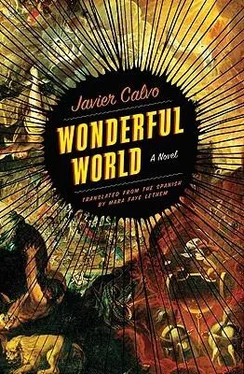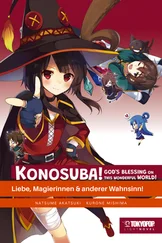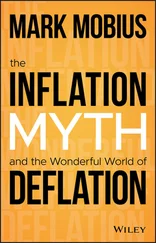Fonseca looks fixedly at Lucas, for a long moment, his facial cavities and treelike elements beating in the darkness. Then he sighs. He leans slightly forward to pick up his briefcase from some area in the dark at the foot of his chair and opens it on his lap. He takes out a bulky file and puts it on the table. Then he takes his own fountain pen out of his suit pocket and leaves it on top of the file. He taps the paper a few times with the tip of his finger. The scene seems to be frozen in that moment. The two men stare at each other across the table. The treelike beating of veins in Fonseca's temples can only be intuited. Lucas Giraut's hands have stopped drawing and seem to be resting in an alert state on the cartonnier's surface. It is difficult not to think of duelists watching each other with their pistols held high at each end of a frozen field. It's difficult not to think of opponents in an action film in one of those scenes where the action freezes and the camera turns dizzyingly around the two men. It is difficult not to think about inexpressive chess players from the Eastern bloc. Finally Lucas Giraut lifts his eyebrows. He lifts his chin.
To his surprise, Fonseca lowers his gaze.
“They are named Koldo Cruz and Bocanegra,” he says. And he uncaps his fountain pen. “Lorenzo's childhood friends. They were two-bit thieves. Your father was the brain of the operation. Until they got tired of splitting the money with him.” He opens the file to the first page. “Sign on every page. Here on the bottom. On the dotted line.”
Lucas Giraut's hand opens one of the drawers of his cartonnier and puts away his notepad and then the fountain pen he was drawing with. Then he pushes a button on the intercom on his desk and waits to hear his secretary's voice.
“We're finished,” says Lucas Giraut to the secretary. Without taking his eyes off of Fonseca. “Please escort Mr. Fonseca out.”
The silence is only interrupted by the barely audible click of the intercom button on Lucas Giraut's desk when he removes his finger. The darkness that surrounds the two men in the office is like a feeling of uneasiness on the edge of your visual field. Sort of like a headache. Fonseca's face starts to transform. The branches of arteries on his temples change color and texture and swell up noticeably. The swelling extends rapidly through the rest of the blood vessels on his face. Like the expansive wave of an explosion. Like a porcelain funereal mask that has remained intact for millennia at the bottom of a tomb but splits with cracks when it comes into contact with the outside air.
Tied to a chair in a greasy-smelling corner of the warehouse commonly known as LEON'S GARAGE, THE GREASY GARAGE or MR. LEON'S EMPIRE OF GREASE, Pavel confirms that the last vestiges of his Rastafarian desire to come together with all his fellow human beings in universal love are vanishing. He is tied to the chair in the classic posture of prisoners about to be subjected to an interrogation with torture. With his arms immobilized behind his back and his ankles tied together.
Immediately in front of Pavel is Leon. The owner of LEON'S GARAGE. Sitting backward on a chair. With his forearms resting on the back of the chair and his legs extended on both sides. Which is to say in the classic position of someone about to use torture as an interrogation technique. Leon runs a gigantic hand through his greasy hair and exhales a mouthful of Russian black tobacco smoke toward Pavel's bruised face.
Pavel focuses on kicking a rat that is sniffing his foot. The depression and fatigue and bad mood that contact with his fellow human beings usually produces in him now manifests itself as an increase in the pull of gravity on the muscles that hold up his head. A decidedly un-Rastafarian weariness. A sinking feeling of the overall decline of the Western world that surrounds him. Of corruption in the very marrow of the world around him. All of it decidedly anti-Rastafarian.
“I know what you're thinking,” says Leon in Russian. With a high-pitched voice that doesn't match his gigantic arms and bald, vaguely bullet-shaped head. “You're thinking: How could this guy be so elegant? It's not because I flaunt my money or anything like that. I'm one of those people who believe that true elegance is worn here, on the inside.” He brings a hand to his chest. He's wearing a paisley shirt and a mustard-colored suit jacket, which even though they aren't too small on him produce an almost painful feeling of smallness. “It's a simple question of dignity. Like this tie, for example.” He picks up his tie with two fingers. It is red and has a repeating gold saxophone pattern. “This lovely tie was a gift from my daughter. And that's why I'm wearing it. I'm passionate about family. And, after all, how do you want me to dress?” He shrugs his shoulders. “You want me to dress like Donald Duck?”
In Pavel's opinion, an overwhelming majority of the population of the modern Western world are complete idiots. We might be talking about seventy percent. The absolute preponderance of complete idiots is not only an obstacle for the evolution of the human species and the realization of ideals such as Rastafarian universal love. These idiots also make life much more difficult on a day-to-day basis. You can leave your house one morning to buy cigarettes, for example, and never come back as a result of a run-in with some complete idiot.
“Oh, did I just mention Donald Duck?” Leon, the complete idiot, furrows his brow. “Now why would I do that? Well, I wouldn't worry if I were you. I don't see any outlets around here. Although wait.” He rests his chin on the back of the chair he's sitting backward in and looks around at the walls covered with grease and calendars and Russian posters. “Isn't that an outlet over there?” He makes a surprised gesture with his enormous palms. “Who knows. Maybe Donald Duck is around here somewhere.”
Several rats, as greasy as everything else in LEON'S GARAGE, scrabble around at the edges of Pavel's visual field. Pavel can't see them well because of the swelling in his right eye and the dreadlocks falling in front of his left eye. In fact, the only thing he can see clearly from his chair is Leon's square, unibrowed face. Beyond Leon, past the groups of rats that scrabble around and which Pavel can only see as quick little stains on the floor, he glimpses another figure. Someone too corpulent to be Donald Duck. And too far from the lightbulb that hangs from the ceiling of LEON'S GARAGE for Pavel to see his face. The only thing that Pavel can make out about him are his shoes and his pants. Shoes and pants that Pavel can only identify as Really Expensive.
“I like your style,” continues Leon. There is something intrinsically greasy about Leon's appearance. Something that has nothing to do with his greasy hair, or even with the extremely greasy condition of LEON'S GARAGE. A certain component of his persona that gives the impression that he would continue to be greasy even right after a hot bath. “I like that black man's hairstyle that you've got. And that guy on your T-shirt, who is he?” He squints his eyes. “It's hard to see with so much blood. Oh, Bob Marley. Of course.” He shrugs. “Bob Marley's not bad. He's got rhythm and all that. But of course, all blacks do.”
Pavel squints and tries to see something more of the man with the Really Expensive shoes and pants in spite of the swelling in his eye and the dreadlocks that hang in front of his face. He makes a mental list of the things that he would like to do to Leon if he weren't tied to a chair in the classic position of prisoners about to be tortured. The list includes, among other things, the rectal insertion of various objects whose morphology makes their insertion into a human rectum very difficult.
Читать дальше












